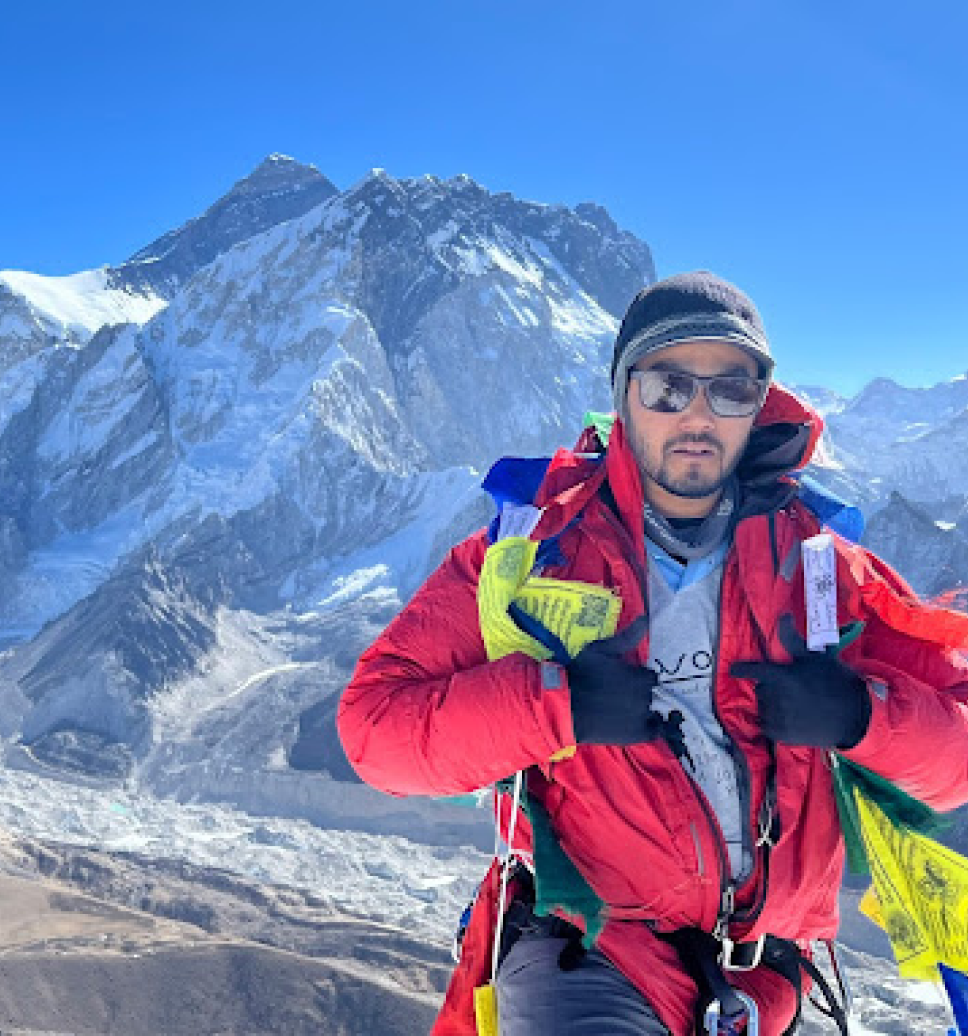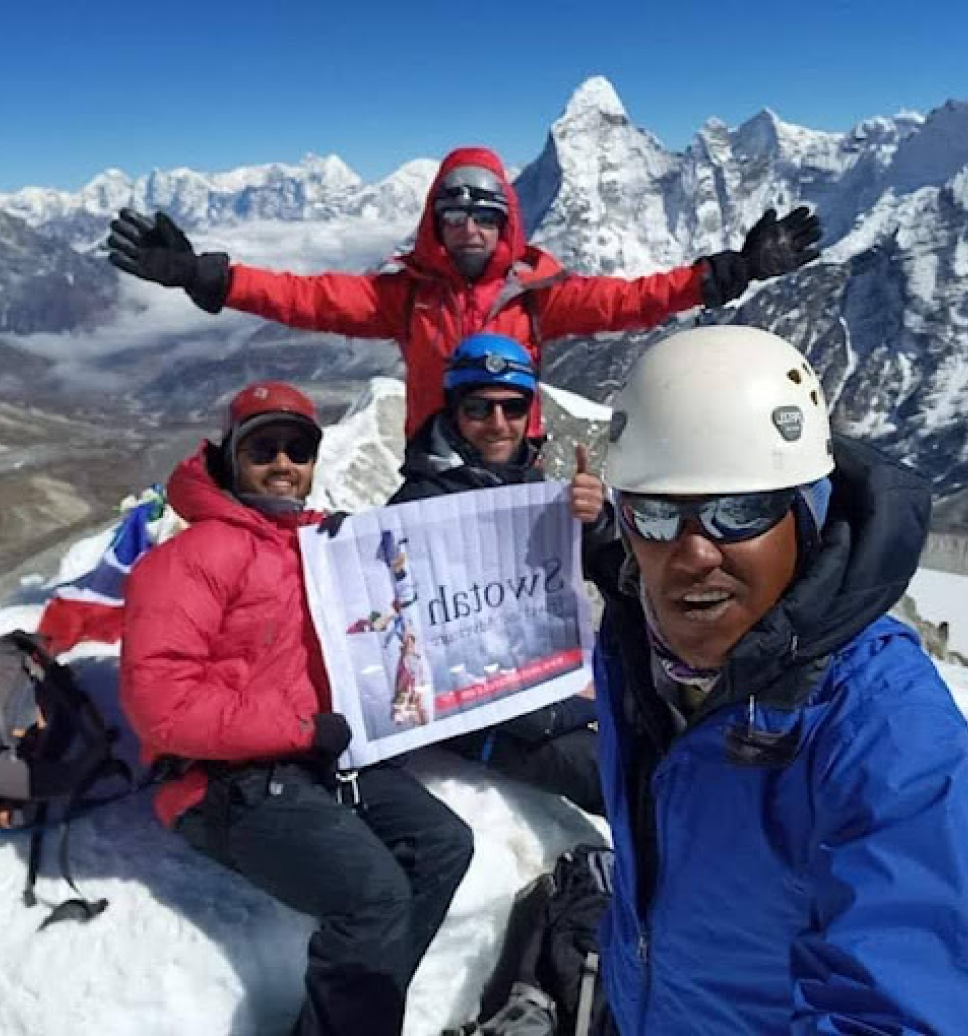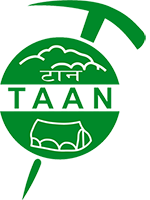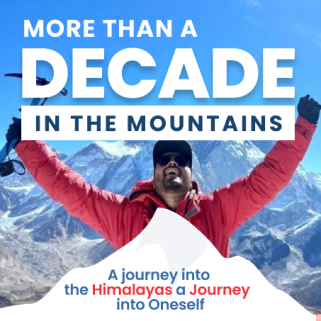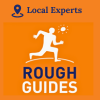GUARANTEED DEPARTURES
Check upcoming trip dates, availability & prices. If you can't see dates that suite you, contact us we will do our best to assist you.
| GUARANTEED DEPARTURES | PRICE | AVAILABILITY | |
| Mar 5, 2026 - Mar 20, 2026 | $2195 | Low | |
| Mar 8, 2026 - Mar 23, 2026 | $2150 | High | |
| Apr 5, 2026 - Apr 20, 2026 | $2195 | High | |
| May 9, 2026 - May 24, 2026 | $2195 | High | |
| Sep 3, 2026 - Sep 18, 2026 | $2175 | High |
Trek Highlights
- Mera Peak has 3 distinct summits: North(6,476 m), Central(6,461 m), and South Mera Peak(6,064 m).
- Mera Peak is considered one of the finest viewpoints in Nepal.
- Mera Peak stands to the south of Everest.
- J.O.M. Roberts and Sen Tenzing made the first successful ascent of Mera Peak on 20 May 1953.
- The major peaks observable from the Mera peak include some of the highest mountains in the world: Mt. Everest, Cho-Oyu, Lhotse, Makalu, Kanchenjunga, Nuptse, and many more.

Mera Peak is one of those peaks that perfectly blend adventure with culture. This week-long peak climbing is one of the most famous peaks among mountaineers. One of the reasons for its popularity is its accessibility to anyone with less or moderate experience in Mountaineering, which means a novice mountaineer can attempt to climb it with the proper guidance of Sherpas and Guides. The highest trekking peak in Nepal transports you through remote, picturesque villages, lush forests, and flora, followed by a gentle climb to the summit. This trip, packed with adventure, nature, and culture, will surely give you an experience of a lifetime.
Tipping Recommendation
We recommend allocating 10-15% of your total tour cost to tipping guides, drivers, and other hardworking staff who ensure your experience is unforgettable. While tipping is not mandatory, it is a meaningful way to support the seasonal workers who dedicate themselves to making your trip extraordinary.
By booking with us and participating in the tipping culture, you are directly contributing to Nepal’s local economy and helping sustain the tourism workforce. This support is crucial in retaining talent within the country and addressing challenges like brain drain.
Your generosity makes a lasting impact—thank you!
Photo Gallery
Dive into our gallery to get a glimpse of the awe-inspiring vistas waiting for you on our guided treks across stunning landscapes.
Brief Itinerary
Day
1
ARRIVAL IN KATHMANDU (1,350M)
Day
2
KATHMANDU SIGHTSEEING
Day
3
FLY TO LUKLA AND TREK TO CHUTANGA (3,050M)
Day
4
TREK TO THULI KHARKA (4,320M)
Day
5
TREK TO KOTHE (3,600M)
Day
6
TREK TO THANGNANG (4,320M)
Day
7
EXPLORE THANGNANG
Day
8
TREK TO KHARE (5,000M)
Day
9
TREK TO MERA BASE CAMP (5,300M)
Day
10
TREK TO HIGH CAMP (5,800M)
Day
11
SUMMIT DAY
Day
12
TREK TO KOTHE (4,300M)
Day
13
TREK TO THULI KHARKA
Day
14
TREK TO LUKLA (2,800M)
Day
15
FLY TO KATHMANDU
Day
16
DEPARTURE
Comprehensive Trek Guide
Experience the ascent to the highest trekking peak in Nepal with Mera Peak climbing. Mera Peak climbing takes you to the summit of Mera Peak, which stands tall at 6476 m and is one of the most sought-after mountaineering peaks in Nepal.
The Mera Peak expedition begins from Kathmandu, followed by a brief flight to Lukla. From Lukla, we head upwards through beautiful hills and valleys to reach the cold mountain region. Lying arduously on the edge of the Khumbu region, Mera Peak Climbing in Nepal is also an excellent opportunity to experience trekking in the Himalayan region of Nepal.
It involves a culturally stimulating venture through remote, picturesque villages and lush forests, followed by summiting the majestic Mera Peak. The Mera peak climbing comes at the end of a week-long trekking expedition, and this expedition is not necessarily technically difficult, but the altitude makes it an exciting and challenging trip.
The trail for the Mera Peak expedition trip ranges from moderate to difficult. Thus, one must be physically fit to go on this trip. With the increase in altitude, the risk of altitude sickness also rises. People with respiratory problems must consult their doctor before heading on this trek. With adequate time of acclimatization and proper hydration, altitude sickness will be less of a problem.
Mera Peak climbing is an amazing option for anyone with less or moderate mountaineering experience. This trek is challenging, but the technical mountaineering skill required is very basic. Experience the thrill of climbing the highest trekking peak in Nepal with the Mera Peak climbing package. Remember Swotah Travel for your trekking companion!
Detailed Itinerary
Meals: Dinner
Accommodation: Hotel
Meals: Breakfast
Accommodation: Hotel
Meals: Breakfast,Lunch,Dinner
Accommodation: Teahouse
Meals: Breakfast,Lunch,Dinner
Accommodation: Teahouse
Meals: Breakfast,Lunch,Dinner
Accommodation: Teahouse
Meals: Breakfast,Lunch,Dinner
Accommodation: Teahouse
Meals: Breakfast,Lunch,Dinner
Accommodation: Teahouse
Meals: Breakfast,Lunch,Dinner
Accommodation: Teahouse
Meals: Breakfast,Lunch,Dinner
Accommodation: Base camp
Meals: Breakfast,Lunch,Dinner
Accommodation: Teahouse
Meals: Breakfast,Lunch,Dinner
Accommodation: Teahouse
Meals: Breakfast,Lunch,Dinner
Accommodation: Teahouse
Meals: Breakfast,Lunch,Dinner
Accommodation: Teahouse
Meals: Breakfast,Lunch,Dinner
Accommodation: Hotel
Meals: Breakfast
Accommodation: Hotel
Meals: Breakfast
Accommodation: N/A
What's Included
- All airport transfers;
- Climbing permit for Mera Peak;
- First aid medical kits for the group and the staff;
- Standard/Deluxe rooms in Kathmandu on a B/B basis;
- Required fixed and dynamic rope during the climbing period.
- Local English-speaking guide for sightseeing in Kathmandu;
- All wages, equipment, medical and accidental insurance for all involved staff;
- Flight tickets for the Ramechaap/Kathmandu-Lukla-Ramechaap/Kathmandu sector to all climbing members and staff;
- All necessary paperwork, office service charges, and government taxes levied in Nepal;
- Necessary staff, including experienced guides and porters, during the trekking and climbing.
- Required experienced, trained and government-licensed climbing guide(s) during the climbing period as per the size of the group;
- Full-day sightseeing in Kathmandu;
- Per person, 20kg baggage allowance by porters (3:1) or Yak during trekking up and 20 kg baggage allowance while returning from Base Camp after climbing the peak;
- Trekking Permit (National Park entry fee) and TIMS card (Trekking Information Management System);
- All trekking and camping equipment like camp furniture, kitchenware, dining tents, guest tents, etc.;
- Appropriate food for high altitude and all climbing crew at base camp and above as required;
- Complete pre-departure information, flight ticket reconfirmation, and visa extension procedure services (if necessary);
- 3 meals a day (breakfast, lunch and dinner with tea or coffee) along with available accommodation or tents for members and staff during trekking and climbing on a twin-sharing basis.
What's not Included
- Lunch and dinner in Kathmandu;
- Travel and rescue insurance;
- International flights, Nepalese visa fee;
- Entrance fees during sightseeing;
- Personal climbing equipment;
- All kinds of personal expenses;
- Icefall fees, Garbage Deposit (sharing with another member) if applicable;
- Wake talkies & filming permit;
- Personal climbing guide (if requested);
- Optional trips and sightseeing if extended.
- Tips for guides and porters (it’s encouraged to tip);
- Excess baggage charges (if you have more than 15 kg of luggage, a cargo charge is around $1.5 per kg).
Frequently Asked Question
1. What are the physical requirements for this trip ?
2. Will your company representative come to receive us upon arrival at the airport ?
3. What type of accommodation will you use at the Kathmandu and during the trek ?
4. How will my booking be processed ?
5. How can I pay the remaining payment after arriving at the Kathmandu ?
6. What type of food can I get during the trek and is it healthy ?
7. Is safe drinking water available while climbing ?
8. What type of transportation do you use ?
9. What is the best season for the trekking ?
10. How can be the weather and the temperature like in the trekking ?
11. How far do I trek each day ?
12. Do your trekking guides have license and the certificates in the tourism sector and Have they received first aid training for the high altitude ?
13. What safety measures can your guides do during the emergency like high altitude sickness, accidents and dehydration ?
14. Are climbing guides well trained and have they already climbed this summit before ?
15. Do we need to book our own international flights to and from the Nepal ?
16. During the trek, can we charge the camera and other equipment ?
17. Is there any communication system during the trek ?
18. Can I use credit card during this trip ?
19. How much additional money do I need to carry with me during the trek ?
20. Can I add extra days to my trekking trip ?
21. Do you prefer yak or porter on the trek or should we need to carry by ourselves ?
22. Can we store our clothes which are not necessary for the trek ?
23. What is the temperature rating of the sleeping bag that you lend of trekkers ?
24. How should I dress during the trek ?
25. Is it possible to change the lodge if it is not in order ?
26. Do you reserve rooms at the lodges before or during the trek ?
27. What immunization will I need ?
28. Do we need to carry our bags by our self or you will provide porters ?
29. What about security during trekking ?
30. will there be a problem for vegetarians ?
Got a question about this tour?
Or looking for customize trip, reach out to our travel experts
Company Reviews
Similar Trips
Related Trips
Let your travels tell a story—crafted by locals, inspired by mountains, and lived by you.
